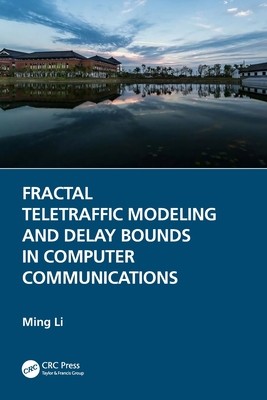
- Išsiųsime per 10–14 d.d.
- Extra -15 % nuolaida šiai knygai su kodu: ENG15
Fractal Teletraffic Modeling and Delay Bounds in Computer Communications + nemokamas atvežimas! | knygos.lt
Atsiliepimai
Aprašymas
By deploying time series analysis, Fourier transform, functional analysis, min-plus convolution, and fractional order systems and noise, this book proposes fractal traffic modeling and computations of delay bounds, aiming to improve the quality of service in computer communication networks.
As opposed to traditional studies of teletraffic delay bounds, the author proposes a novel fractional noise, the generalized fractional Gaussian noise (gfGn) approach, and introduces a new fractional noise, generalized Cauchy (GC) process for traffic modeling.
Researchers and graduates in computer science, applied statistics, and applied mathematics will find this book beneficial.
Ming Li, PhD, is a professor at Ocean College, Zhejiang University, and the East China Normal University. He has been an active contributor for many years to the fields of computer communications, applied mathematics and statistics, particularly network traffic modeling, fractal time series, and fractional oscillations. He has authored more than 200 articles and 5 monographs on the subjects. He was identified as the Most Cited Chinese Researcher by Elsevier in 2014-2020. Professor Li was recognized as a top 100,000 scholar in all fields in 2019-2020 and a top 2% scholar in the field of Numerical and Computational Mathematics in 2021 by Prof. John P. A. Ioannidis, Stanford University.
EXTRA 15 % nuolaida
Kupono kodas: ENG15
Akcija baigiasi už 6d.09:09:26
Nuolaidos kodas galioja perkant nuo 10 €. Nuolaidos nesumuojamos.

- Autorius: Ming Li
- Leidėjas: CRC Press
- ISBN-10: 1032215267
- ISBN-13: 9781032215266
- Formatas: 15.2 x 22.9 x 1.3 cm, minkšti viršeliai
- Kalba: Anglų
By deploying time series analysis, Fourier transform, functional analysis, min-plus convolution, and fractional order systems and noise, this book proposes fractal traffic modeling and computations of delay bounds, aiming to improve the quality of service in computer communication networks.
As opposed to traditional studies of teletraffic delay bounds, the author proposes a novel fractional noise, the generalized fractional Gaussian noise (gfGn) approach, and introduces a new fractional noise, generalized Cauchy (GC) process for traffic modeling.
Researchers and graduates in computer science, applied statistics, and applied mathematics will find this book beneficial.
Ming Li, PhD, is a professor at Ocean College, Zhejiang University, and the East China Normal University. He has been an active contributor for many years to the fields of computer communications, applied mathematics and statistics, particularly network traffic modeling, fractal time series, and fractional oscillations. He has authored more than 200 articles and 5 monographs on the subjects. He was identified as the Most Cited Chinese Researcher by Elsevier in 2014-2020. Professor Li was recognized as a top 100,000 scholar in all fields in 2019-2020 and a top 2% scholar in the field of Numerical and Computational Mathematics in 2021 by Prof. John P. A. Ioannidis, Stanford University.




Atsiliepimai